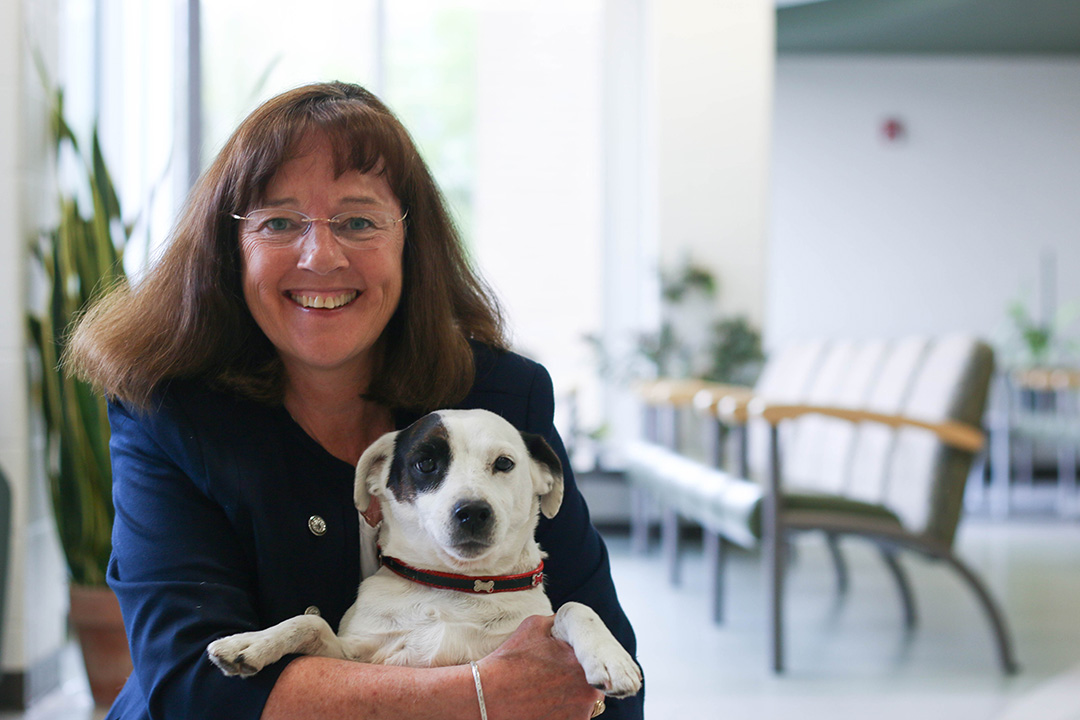
Dowling masters the art of change
It may seem unusual to walk away questioning your own judgments and biases after a conversation with a veterinary pharmacologist, but this is exactly the type of deep thinking Dr. Trish Dowling inspires.
By Jeanette NeufeldAfter more than two decades of teaching, the Western College of Veterinary Medicine (WCVM) professor has turned the clichés of traditional classroom learning upside down.
“You have all the books, right here,” says Dowling, picking up her smartphone.
This recognition of the accessibility of information and an affinity for technology has led her down a different path when it comes to how she delivers lectures at the WCVM.
There’s no standing at the front of the classroom repeating the information contained in a textbook. Instead, she uses a “flipped classroom” approach, inviting the students to read and interpret the materials ahead of time using an online system called Perusall.
The evenings before her classes, she makes a cup of tea and logs into the system from home, checking out how the students are responding to the material – and to each other.
“When somebody doesn’t understand and the other student explains it to them and draws a diagram, I get tears in my eyes,” says Dowling.
Instead of spending class time repeating the material, Dowling then works through clinical cases with the students. She incorporates storytelling, videos, photos and podcast recordings into her lectures in order to appeal to different learning styles, ensuring that students’ knowledge of what drugs to use in their veterinary practice is based on understanding rather than memorization.
“She’s had a major impact on a generation of veterinarians,” says Dr. Chris Clark, the WCVM’s associate dean (academic). He led Dowling’s nomination for the University of Saskatchewan’s (USask) Master Teacher Award, bestowed at the fall convocation ceremonies.
Clark says Dowling deserves the award for her approach to veterinary pharmacology alone, but says her work in teaching graduate student courses outside the college and developing a veterinary mindfulness elective unique to the WCVM are equally worthy of accolades.
Dowling’s success as a professor admittedly didn’t happen overnight.
Twenty-five years earlier, Dowling describes being ““terrified” during her first days of teaching at the WCVM.
I walked in there, tripped] over the trashcan and then just started doing it,” she says.
She credits some of her affinity for the classroom to genetics — she’s one of four “Doctors Dowling” — a group of siblings who, exclusive of Dowling’s own impressive credentials, hold PhD degrees in Shakespearean English, mathematical physics, business, and a master’s degree in public health from Harvard University.
A self-described “space brat,” Dowling’s father built lunar modules in New Mexico before settling the family in Texas, where Dowling eventually earned her Doctor of Veterinary Medicine (DVM) at Texas A&M University.
After a large animal internship at North Carolina State University, she worked in private practice for a short time in Ohio and North Carolina, gathering stories she still incorporates in the classroom. She went on to complete residency in large animal internal medicine and a master’s degree in clinical pharmacology at Auburn University and achieved double board certification in large animal internal medicine and clinical pharmacology.
Despite not packing enough warm clothing on her first visit to Saskatchewan, Dowling decided to take a job at the WCVM. She soon met her husband and what was intended to be a brief stay in Canada turned into a career.
After about a decade of teaching, Dowling dove into pedagogy — the study of teaching — tapping into resources available through the USask Gwenna Moss Centre for Teaching and Learning. She also met her own “personal Yoda”: Dr John Thomson, a retired professor of sociology at St. Thomas More College, and an award-winning teacher himself.
Through Thomson’s mentorship, Dowling took over teaching a graduate studies course called “Thinking Critically.” She has been instrumental in helping graduate students develop professional and personal skills that prepare them for employment outside of academia.
In 2008, after enduring her own mental health struggles, she discovered mindfulness-based stress reduction (MBSR) and developed her own meditation and yoga practice.
These healthy habits have allowed her to balance a full teaching load with clinical research and work as one of three Canadian veterinarians overseeing antibiotic withdrawal times for food animals as part of an organization called the Canadian Global Food Animal Residue Avoidance Databank (CgFARAD).
She also sits on the equine medications committee for Equestrian Canada, delivers public education on antimicrobial stewardship, and teaches wellness and mindfulness practices to veterinarians and technicians across North America.
Dowling’s popular Mindful Veterinary Practice (MVP) elective course allows busy third-year veterinary students to engage in MBSR self-care practices for credit. She brings healthy snacks for the students, which at first prompted ridicule.
“Because of the juice boxes they started calling it ‘Dowling’s little cult,’” she says. “After the first class, the word went out that mindfulness training is very valuable for thriving in a career in veterinary medicine, and the jokes stopped.”
The skills developed in MVP go beyond students “taking a break” and extend to their own communication and relationship skills, particularly when dealing with clients.
”With mindfulness, you learn to check in with yourself and your state of mind before you walk in the door of the exam room. And once in there, not only do you ask the client questions, but listen to the answers with an open mind and heart,” she says.
And just like that, she is making you question yourself and how you see the world around you — the true mark of a successful teacher.
